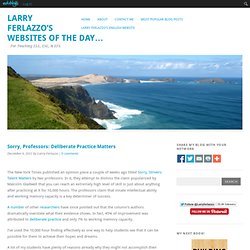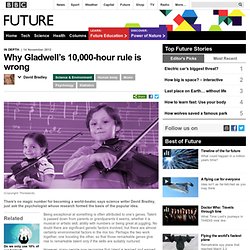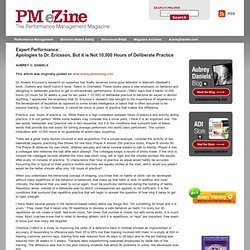

Fichamentos. Sorry, Professors: Deliberate Practice Matters. The New York Times published an opinion piece a couple of weeks ago titled Sorry, Strivers: Talent Matters by two professors.

In it, they attempt to dismiss the claim popularized by Malcolm Gladwell that you can reach an extremely high level of skill in just about anything after practicing at it for 10,000 hours. The professors claim that innate intellectual ability and working memory capacity is a key determiner of success. A number of other researchers have since pointed out that the column’s authors dramatically overstate what their evidence shows. In fact, 45% of improvement was attributed to deliberate practice and only 7% to working memory capacity.
I’ve used the 10,000 hour finding effectively as one way to help students see that it can be possible for them to achieve their hopes and dreams. A lot of my students have plenty of reasons already why they might not accomplish their goals. Is it true that 10,000 hours of practice will make you an expert at something? Science & Environment - Why Gladwell’s 10,000-hour rule is wrong. There’s no magic number for becoming a world-beater, says science writer David Bradley, just ask the psychologist whose research formed the basis of the popular idea.

Being exceptional at something is often attributed to one’s genes. Talent is passed down from parents or grandparents it seems, whether it is musical or artistic skill, ability with numbers or being great at juggling. No doubt there are significant genetic factors involved, but there are almost certainly environmental factors in the mix too. Perhaps the two work together, one boosting the other, so that those remarkable genes give rise to remarkable talent only if the skills are suitably nurtured. However, many people now recognise that talent is learned and earned through extended and intense practice of a skill. This idea is encapsulated in a golden rule made popular by the writer Malcolm Gladwell in his book Outliers. Ericsson and his colleagues discovered a similar pattern in professional and amateur pianists. Expert Performance: Apologies to Dr. Ericsson, but it is not 10,000 hours of deliberate practice. This article was originally posted on www.aubreydanielsblog.com Dr.

Anders Ericsson’s research on expertise has finally received some good attention in Malcolm Gladwell’s book, Outliers and Geoff Colvin’s book, Talent Is Overrated. These books place a new emphasis on behavior and designing in deliberate practice to get to extraordinary performance. Ericsson (1990)¹ says that it takes 10,000 hours (20 hours for 50 weeks a year for ten years = 10,000) of deliberate practice to become an expert in almost anything. I appreciate the emphasis that Dr. Ericsson’s research has brought to the importance of experience in the development of expertise as opposed to some innate intelligence or talent that is often assumed to be beyond ‘training’. Practice, yes; hours of practice, no. There are a great many factors involved in skill acquisition. I have heard several people in the behavior-based safety arena say things like, “Do something 30 times and it is yours.”